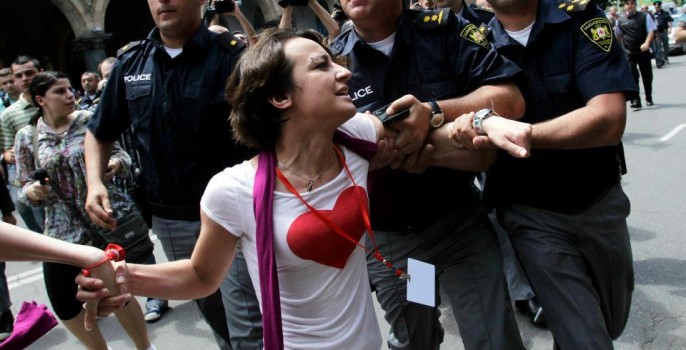When LGBTI activists organised a march to mark International Day Against Homophobia and Transphobia in 2012 in the Georgian capital of Tbilisi, it was significant for two reasons. One was that religious counter-demonstrators, linked to the Georgian Orthodox Church and radical Christian groups, verbally and physically attacked participants. As a critical report from Amnesty Internationalexplained shortly afterwards:
“On Thursday, a peaceful march in central Tbilisi marking the International Day against Homophobia and Transphobia came under attack when a group of Orthodox Christians and members of the “Orthodox Parents’ Union” began insulting and threatening protesters from IDENTOBA, a Georgian LGBTI rights organization.
Orthodox priests were among the counter-demonstrators, who prevented the marchers from continuing to the Georgian Parliament, shouting abuse and throwing punches at the peaceful protesters. Fighting reportedly broke out as the counter-demonstrators attacked marchers, tearing up placards.”
Police, rather than arrest the perpetrators, took the decision to arrest LGBTI activists, including three members of the organising group, Identoba. Aside from condemnation from Amnesty International, the group has also sought international recognition – of police failure to protect participants – from the European Court of Human Rights; filing an application against Georgia on January 13, 2013.
The second reason the protest was significant is that it was the first public demonstration in favour of LGBTI rights ever held in Georgia, a small country of less than 5 million people which borders the comparatively massive, and culturally looming, Russian Federation. Like its neighbour, the question of LGBTI rights in Georgia is often framed through the lens of ’propaganda’. And – according to a 2009 survey – an estimated 91.5% of Georgians see homosexuality as ’never acceptable’.
This year’s silent “flashmob” protest will therefore be a highly significant event. Identoba activists have taken the decision to hold a public protest, perhaps accompanied by a march, outside the Georgian Parliament on May 17, 2013. Organisers are set to present themselves silently holding placards, contesting homophobia and transphobia, and therefore to publicly dramatise their silencing at the hands of Georgian authorities and social attitudes.
Let us hope that this year, this second march will also be significant in passing without assault, and that police will fulfil their responsibility to protect participants.
For more information log onto the Identoba site.
Photo: A participant being arrested at last year’s IDAHO march. Courtesy of Identoba.


